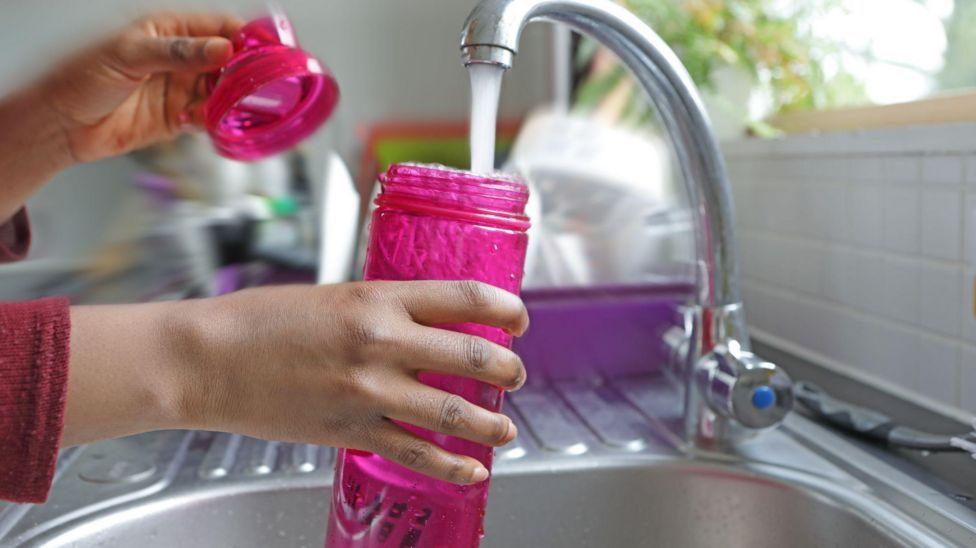How much will I have to pay for my water?

- Published
Water bills in England and Wales rose by an average of £123 a year in April 2025.
It means the average annual bill is now £603, but there are significant differences between water companies. Households cannot choose their supplier.
How much have water bills risen by in England and Wales?
The average bill went up in April by around £10 a month - from £40 to £50 - but millions of households faced even steeper rises.
Southern Water customers saw a 47% increase to £703 a year, while Hafren Dyfrdwy, Bournemouth Water and South West Water bills rose by 32%.
Thames Water customers faced a 31% hike and Yorkshire Water raised bills by 29%.
Customers of Bristol Water saw an 4% increase, while Essex and Suffolk Water bills went up by 11%. Sutton and East Surrey Water bills fell by 2%.
In October, five water companies won their appeal to impose larger increases on more than seven million household and business customers because the firms' borrowing costs had risen.
The Competition Markets Authority (CMA) agreed to let Anglian and Northumbrian put up their bills by a further 1%, Southern by 3%, South East by 4% and Wessex by 5%. The companies had asked for much larger increases.
Water UK - which represents water firms - said the additional price rise agreed by the CMA would cost customers an extra "£1 per household, per month", on average.
The CMA proposal is provisional, and has to be approved by the water regulator Ofwat. The firms can also respond before the decision is confirmed.
Thames Water also appealed for permission to increase price rises for its customers, but deferred its case until late October while it tries to agree a financial rescue plan to secure the company's future.
Why have water bills gone up?
Water firms have long argued that they need extra money to replace ageing, leaking pipes and to reduce sewage discharges into rivers and seas.
However, companies have also been facing growing scrutiny and public anger over their environmental and financial performance, as well as executive bonuses and pay.
There has been a lot of disagreement about price rises between Ofwat and the water companies.
In December 2024, Ofwat said companies could raise bills by an average of £31 a year over the next five years, with those increases to be front-loaded.
That means customers have already seen the biggest rise in the first year of the period, and smaller increases due to follow over the next four years.
How can I save money on my water bill?

Some households in England and Wales have a water meter, so only pay for the amount they use, plus a standing charge.
Unmetered customers pay a set amount regardless of how much water they use. This is usually based on the rateable value of their home - an approximate annual rental value for the property.
All households also pay for sewerage services, either as part of their water bill or separately if their water company doesn’t deliver wastewater services.
There are a number of ways to try to reduce your water bill:
Use less water: Many water companies offer customers free water-saving devices. Take showers instead of baths and use a timer. Only run washing machines and dishwashers with full loads. Don't overfill your kettle. If you water your garden, install a water butt to capture rainwater.
Check your bill: Look out for any unexplained increases - you may have a leak.
Get a water meter: Meters can reduce bills for some. Every household can apply to have one installed. If a meter is not suitable, your water company must offer something called an “assessed charge” which may also save you money.
Move to a social tariff: Every water company offers a scheme which can help reduce your bills if you’re on a low income but the each firm's rules are different.
Sewage service rebates: Households may be able to get a rebate for certain sewage services if they can prove they do not use them.
What if I can’t pay my water bill?
Water companies said they would set aside more than £4bn to fund social tariffs - the discounted bills for vulnerable people - over the next five years.
But the Consumer Council for Water (CCW), which represents billpayers, argued support did not go far enough, as about 2.5 million households were already in debt to their water company.
The amount of financial support available to those struggling and the qualifying criteria vary by company.
How much have water companies been fined for poor performance?
As part of its price review, Ofwat sets performance targets to encourage water companies to meet their commitments to customers and the environment.
They are expected to reduce leakage, pollution incidents and sewer flooding.
If a company beats its targets it may get a financial reward. If it does not meet them, it may face a penalty.
In 2025-26 water companies were ordered to return £158m to customers via lower bills, external after missing key pollution and leak targets.
How much are water bills in Scotland and Northern Ireland?
A small number of Scottish households have water meters.
However, most pay for water and sewerage services as part of their council tax, with the amount linked to their property's council tax band.
Average bills rose by £44 in 2025-26, according to Scottish Water., external
Someone living in a council tax band C property pays on average £533.68 for water and sewerage services.
Households in Northern Ireland are not billed for water.
Get in touch
How are you affected by rising bills?